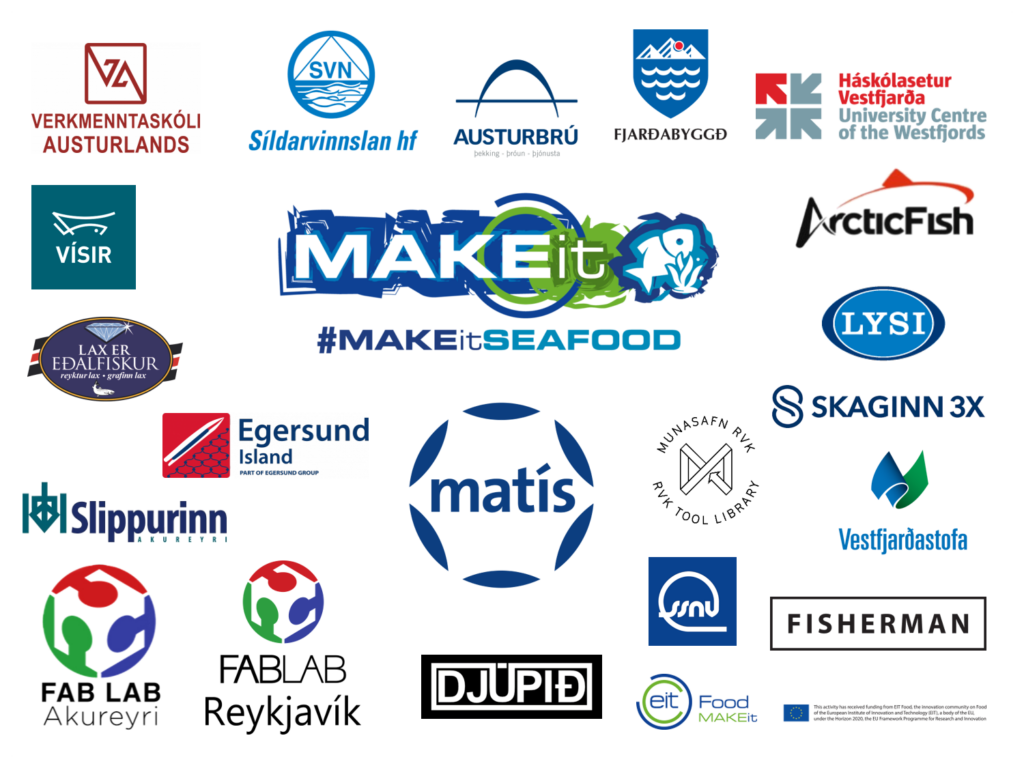From September 10th to 18th, Matís held MAKEathon innovation competition in Iceland. The competition is divided into two workshops; on the one hand in the Westfjords, more specifically in Bolungarvík, and on the other hand in Reykjavík, Akureyri and Neskaupsstaður. The latter workshop took place online.
MAKEathon in Iceland is part of the European project MAKE-it! and is sponsored by EIT FOOD. This means that eleven parties across Europe are holding MAKEathon in their home country, where food production is examined separately.
MAKEathon is an innovation competition that focuses on creating something by hand to meet a specific challenge or problem. MAKEathon in Iceland aimed to find solutions to increase the value of raw materials from the fishing industry in order to make processing more sustainable.
There were a total of 50 participants and they formed 10 teams. Nineteen partners, companies and educational institutions, participated in the project.
Snacks from side products
Participants in the Westfjords met in Bolungarvík, but they all came from the University Center of the Westfjords. The students had already been screened for COVID-19 and all infection control rules were followed. The teams in Bolungarvík were given salmon bones to work with and had access to an industrial kitchen in the Deep where the event took place. Gunnar Þórðarsson, project manager at Matís and Gunnar Ólafsson at Djúpinur made sure that everything went according to plan and enjoyed the support of Arctic Fish, Eðalfisk and Vestfjarðastofa. Þórarinn Gunnarsson from Fablab Ísafjörður also helped with the product development. The jury consisted of Jón Páll Hreinsson, mayor of Bolungarvík, Sigríður Kristjánsdóttir and Þórkatla Soffía Ólafsdóttir from Vestfjarðastofa. The team SOS - Salmon on Seaweed won the competition with an innovative snack that resembles pepperoni except the difference is that the SOS product is made from fish. The group's idea was considered both progressive and credible.
Eco-friendly growing paper
MAKEathon in Reykjavík, Akureyri and Neskaupstaður, on the other hand, took place online, where 21 participants met at a Zoom teleconference. Participants received cod bones and fish skin, as well as a special toolbox to work on the prototype. They were also invited to visit Fablab in Reykjavík or Akureyri to learn about how to develop a prototype.

MAKEathon in Iceland ended on the 18th of September. Kristján Skarphéðinsson, Director General of the Ministry of Fisheries and Agriculture, took part in the closing ceremony and spoke about the importance of sustainable resource utilization, innovation and entrepreneurship in the fisheries sector. He then announced the winner of the competition which the jury, appointed by Sunna Halla Einarsdóttir (Icelandic Startups), Rannveiga Björnsdóttir (University of Akureyri) and Benedikt Stefánsson (Egersund), chose after much thought.
The winner of the competition was the team Otoseed, which is made up of individuals from different backgrounds, with diverse backgrounds, but they did not know each other before the competition. The winning team presented a solution that uses not only by-products from the fishing industry, but also other types of surplus, for example from coffee. This is a special paper that contains by-products from fish from which seeds can be grown. You can view their project on the team's website here.
We hope to repeat the game and we encourage interested partners who are interested in holding MAKEathon with us in the future to contact us.

